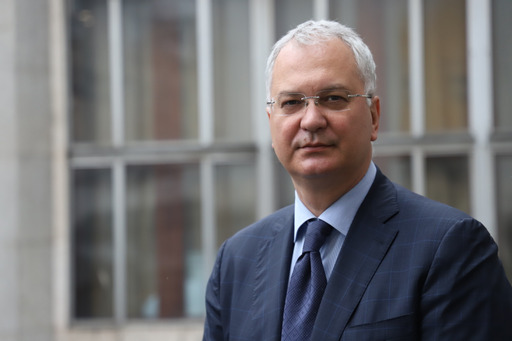During the week, the “big five” visited Belgrade and Pristina. After that, President Vučić announced that he was told, right in the second sentence, that Serbia must accept the plan for Kosovo. How does it seem to you? As a threat? An ultimatum?
Unlike previous negotiations and various proposals that came from the international community, this time Serbia is facing a proposal that, in addition to the countries that recognized the independence of Kosovo, is supported by all EU countries as well as the United States. It is almost impossible to imagine that, for example, Spain will recognize the independence of Kosovo, but it is obvious that this agreement brings such a change that suits states that do not intend to recognize Kosovo, which gives special weight to the proposed solution.
When the diplomats of the leading EU countries make such an effort to have a common and unified position, it is to be expected that they act with much greater capacity towards both Belgrade and Pristina. Undoubtedly, this time they are more determined in their desire to solve the problem. That determination is mostly reflected in the fact that it was said that, if Serbia rejects the plan, it will suffer consequences. Let me remind you that Serbia is completely economically dependent on the EU, the largest number of foreign investments comes from EU member states, while our economy has absolutely no opportunities if any disruption in relations with the EU occurs. These days, some irresponsible politicians are trying to present the consequences of rejecting the agreement to our public as inability to travel abroad on trips, shopping… however, this is a trivialization of everything that could happen to citizens, which would be a complete disaster from the aspect of the living standards of every citizen, increase in poverty… And all these are not threats, it is a reality that would occur to us, because it is difficult to imagine a single EU citizen who would willingly allocate his money for donations to Serbia or who would support a visa-free regime for the citizens of a country that has self-isolated. Therefore, there are no threats, just as there are no ultimatums, simply if we do not want to acknowledge the views of all EU member states, I see no reason why they should acknowledge and care about our interests. At this moment, no one in the EU would be worried if Serbia stopped on its European path, if foreign investments stopped or companies withdrew from Serbia, these are not topics that are of interest to EU citizens, and it is up to us not to end up in that situation.
We have not seen the plan, but it is mentioned that it contains everything except the recognition of Kosovo’s independence and membership in the UN. Would such a plan be acceptable to you?
There is no government in Serbia that did not have some kind of plan for the solution of the Kosovo dispute. Thanks to his disastrous moves and rather incredible misunderstanding of geopolitics, Milošević did not hesitate to shift from the the field of diplomacy to the field of battle, and this is where the biggest problem arose. The degree of naivety that Milošević had in believing that Moscow would help him is interesting, and it is rather curios that such naivety is still present even after three decades. As much as Moscow helped us then, it will help us even less now, therefore no help at all. Critics of the agreement say that we must not give up a part of the territory, but they forget that throughout Serbian history, territories often changed through wars, and we conquered territories in victorious wars just as we lost them defeats. Milošević led us into a war that we lost, and subsequently, we signed the capitulation by which we renounced not only sovereignty over Kosovo and Metohija, but also a 5 km of land and 25 km of air safety zone within central Serbia. Thanks to wise policy, Đinđić managed to bring the army and police back to the administrative line in 2001, but nothing more could be done. Despite numerous attempts, the abolition of the air safety zone was successfully negotiated only in 2015. After more than 23 years, relations between Belgrade and Pristina are worsening, there is a daily danger of conflict, which puts EU and US officials in a position to provide a solution that is not ideal for either Belgrade or Pristina. Honestly, we know that there is no ideal solution for both sides. I remind you, the biggest war since 1945 is being fought over European land, some media from Moscow are announcing the continuation of the conflict over the Western Balkans, and all this affects nervously the EU countries, which are not bluffing this time. The state leadership of Serbia faces a difficult task, but the only right solution is to try to get as much as possible through dialogue and accept an agreement that saves both the citizens and the state from a possible, overall, collapse.
The day before Vučić’s meeting with the “five”, you spoke with Gabriel Escobar in America. What did he tell you?
It was a very interesting meeting, it is clear that the US administration wants to raise the overall relations with Serbia to a higher level, that they understand the problem we are facing, but also that historical circumstances have brought us here and that time cannot be reversed, just like the decisions that were made. The US understands the importance of Serbia in the region, but also provides great support to the new EU plan and the Brussels agreement. Just look at how the media from Pristina and their Twitter troll farms are reacting, all of them attacking the US envoy Escobar, who said in Pristina that the signed agreements must be implemented and that the Association of Serbian Municipalities must be established. The amount of diplomatic activity, energy and effort invested by the US administration in de-escalating the recent crisis clearly shows that their interest is peace, stability and economic progress.
Officials from the West say that the ASM must be formed. From Priština they reply that it could, but only according to the Kosovo constitution, while Belgrade accepts that it can only be done according to the Brussels agreement. Could, and how could, these differences be overcome?
It could be said that this is a question for the officials of the EU, which is the mentor and guarantor of the Brussels Agreement. I remind you that some Brussels officials thought that the agreement was worthy of a Nobel Prize. If Kurti is more powerful than both Brussels and Washington, then again, it is not our problem. After several statements, primarily by American officials, I expect Pristina to come to its senses, otherwise it is pointless to sign anything.
The president announced that once we receive the plan, the citizens and the National Assembly will have their say. Do you think that way the plan can go through?
I must admit that I was surprised by the reaction of a part of the public who reduced their criticism to their personal attitude towards president Vucic, and who sees their political opportunity through the failure of negotiations. The status of Vucic and the relationship of the EU and the USA towards him are not being negotiated, the perspective of every citizen of Serbia is being negotiated, whether we will be ostracized from all countries or whether we will catch up with modern Europe. The parties that are declaratively in favor of the EU have a completely wrong strategy, and now they are the loudest in criticizing the agreement that was offered by the EU and which they say they have not even seen yet. Anyone who sees the collapse of the agreement as an opportunity for their daily political gain does not care about the citizens or the state.
Nationalist, right-wing parties, as expected, do not accept the plan. If it is signed, do you expect any response, protests?
There are no nationalist and right-wing parties in Serbia, they all act as outposts of the darkest political catacombs of Moscow and not one of them understands that patriotism does not imply a greater love for a foreign country than for one’s own. Of course, they will try to destabilize Serbia through, certainly destructive demonstrations, the stopping of further EU path, if possible, turning us towards the collapsing CSTO, from which permanent members are fleeing. However, every responsible politician and citizen must keep in mind that this is an agreement for the future, that we have considered various solutions in the past and that we are where we are because we did not understand the geostrategic political currents.
The situation in Kosovo is not calming down. In the last few weeks, we had several incidents in which several Serbs were wounded or injured. It is especially worrying that children are among the injured… How can this be solved?
The matter is more than clear here, since the beginning of the Russian aggression against Ukraine, Kurti has been trying to cause incidents on the territory of Kosovo that would turn into conflicts in which he would play the victim – “Ukraine”, and Serbia would be “Russia”. The entire narrative and his activities are heading towards that direction, however, they were “discovered” by both Brussels and Washington, and such tactics have no support anywhere. With this agreement, Kosovo does not get any more independence than it already has, and I expect that there will be demonstrations in Pristina that will be against the agreement and will be organized by Kurti. That moment will be extremely challenging for all the security forces in Kosovo and I hope that KFOR strategists have already considered such a possibility and that the reaction will be adequate.
If the plan is not signed, what could be the consequences?
In the event that the opposite party accepts and Serbia rejects the plan, the consequences will be long-lasting and unforeseeable. We will be an isolated island at the tail end of Europe, with an accelerated economic decline, increased unemployment, with even greater social stratification, with a dark perspective and with a guaranteed decade left behind. The citizens of Serbia do not deserve this, and responsible politicians must do everything to prevent this from happening.

